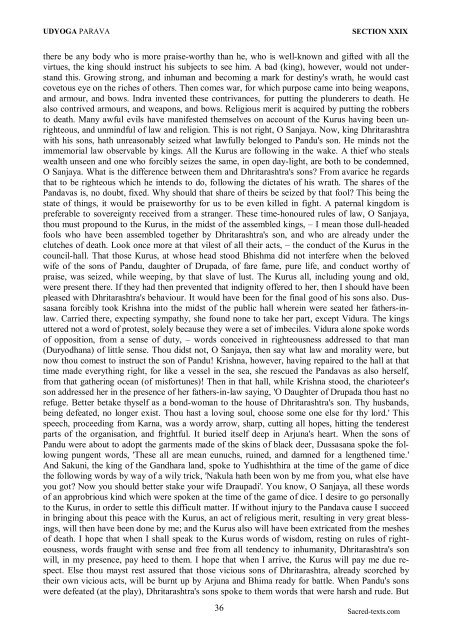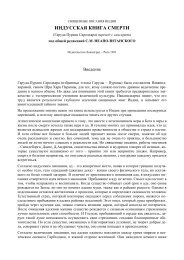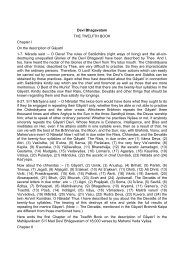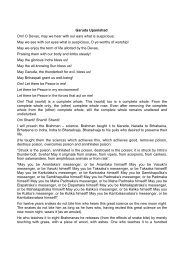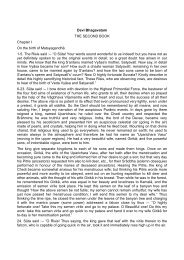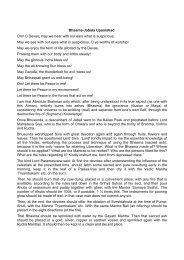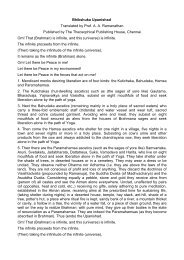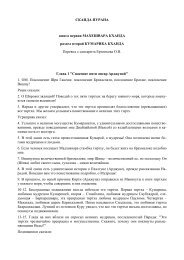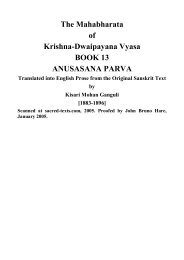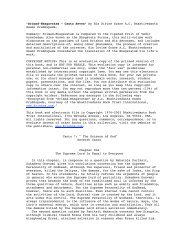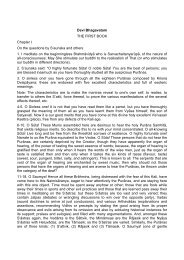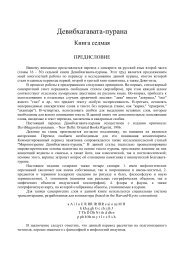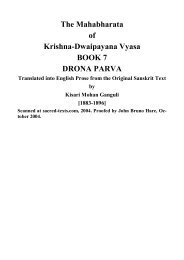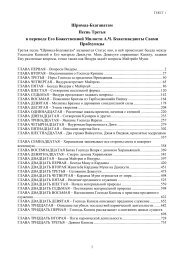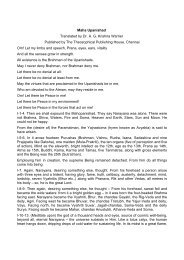Mahabharata 05 (eng)..
Mahabharata 05 (eng)..
Mahabharata 05 (eng)..
You also want an ePaper? Increase the reach of your titles
YUMPU automatically turns print PDFs into web optimized ePapers that Google loves.
UDYOGA PARAVA<br />
SECTION XXIX<br />
there be any body who is more praise-worthy than he, who is well-known and gifted with all the<br />
virtues, the king should instruct his subjects to see him. A bad (king), however, would not understand<br />
this. Growing strong, and inhuman and becoming a mark for destiny's wrath, he would cast<br />
covetous eye on the riches of others. Then comes war, for which purpose came into being weapons,<br />
and armour, and bows. Indra invented these contrivances, for putting the plunderers to death. He<br />
also contrived armours, and weapons, and bows. Religious merit is acquired by putting the robbers<br />
to death. Many awful evils have manifested themselves on account of the Kurus having been unrighteous,<br />
and unmindful of law and religion. This is not right, O Sanjaya. Now, king Dhritarashtra<br />
with his sons, hath unreasonably seized what lawfully belonged to Pandu's son. He minds not the<br />
immemorial law observable by kings. All the Kurus are following in the wake. A thief who steals<br />
wealth unseen and one who forcibly seizes the same, in open day-light, are both to be condemned,<br />
O Sanjaya. What is the difference between them and Dhritarashtra's sons? From avarice he regards<br />
that to be righteous which he intends to do, following the dictates of his wrath. The shares of the<br />
Pandavas is, no doubt, fixed. Why should that share of theirs be seized by that fool? This being the<br />
state of things, it would be praiseworthy for us to be even killed in fight. A paternal kingdom is<br />
preferable to sovereignty received from a stranger. These time-honoured rules of law, O Sanjaya,<br />
thou must propound to the Kurus, in the midst of the assembled kings, – I mean those dull-headed<br />
fools who have been assembled together by Dhritarashtra's son, and who are already under the<br />
clutches of death. Look once more at that vilest of all their acts, – the conduct of the Kurus in the<br />
council-hall. That those Kurus, at whose head stood Bhishma did not interfere when the beloved<br />
wife of the sons of Pandu, daughter of Drupada, of fare fame, pure life, and conduct worthy of<br />
praise, was seized, while weeping, by that slave of lust. The Kurus all, including young and old,<br />
were present there. If they had then prevented that indignity offered to her, then I should have been<br />
pleased with Dhritarashtra's behaviour. It would have been for the final good of his sons also. Dussasana<br />
forcibly took Krishna into the midst of the public hall wherein were seated her fathers-inlaw.<br />
Carried there, expecting sympathy, she found none to take her part, except Vidura. The kings<br />
uttered not a word of protest, solely because they were a set of imbeciles. Vidura alone spoke words<br />
of opposition, from a sense of duty, – words conceived in righteousness addressed to that man<br />
(Duryodhana) of little sense. Thou didst not, O Sanjaya, then say what law and morality were, but<br />
now thou comest to instruct the son of Pandu! Krishna, however, having repaired to the hall at that<br />
time made everything right, for like a vessel in the sea, she rescued the Pandavas as also herself,<br />
from that gathering ocean (of misfortunes)! Then in that hall, while Krishna stood, the charioteer's<br />
son addressed her in the presence of her fathers-in-law saying, 'O Daughter of Drupada thou hast no<br />
refuge. Better betake thyself as a bond-woman to the house of Dhritarashtra's son. Thy husbands,<br />
being defeated, no longer exist. Thou hast a loving soul, choose some one else for thy lord.' This<br />
speech, proceeding from Karna, was a wordy arrow, sharp, cutting all hopes, hitting the tenderest<br />
parts of the organisation, and frightful. It buried itself deep in Arjuna's heart. When the sons of<br />
Pandu were about to adopt the garments made of the skins of black deer, Dussasana spoke the following<br />
pungent words, 'These all are mean eunuchs, ruined, and damned for a l<strong>eng</strong>thened time.'<br />
And Sakuni, the king of the Gandhara land, spoke to Yudhishthira at the time of the game of dice<br />
the following words by way of a wily trick, 'Nakula hath been won by me from you, what else have<br />
you got? Now you should better stake your wife Draupadi'. You know, O Sanjaya, all these words<br />
of an approbrious kind which were spoken at the time of the game of dice. I desire to go personally<br />
to the Kurus, in order to settle this difficult matter. If without injury to the Pandava cause I succeed<br />
in bringing about this peace with the Kurus, an act of religious merit, resulting in very great blessings,<br />
will then have been done by me; and the Kurus also will have been extricated from the meshes<br />
of death. I hope that when I shall speak to the Kurus words of wisdom, resting on rules of righteousness,<br />
words fraught with sense and free from all tendency to inhumanity, Dhritarashtra's son<br />
will, in my presence, pay heed to them. I hope that when I arrive, the Kurus will pay me due respect.<br />
Else thou mayst rest assured that those vicious sons of Dhritarashtra, already scorched by<br />
their own vicious acts, will be burnt up by Arjuna and Bhima ready for battle. When Pandu's sons<br />
were defeated (at the play), Dhritarashtra's sons spoke to them words that were harsh and rude. But<br />
36 Sacred-texts.com


